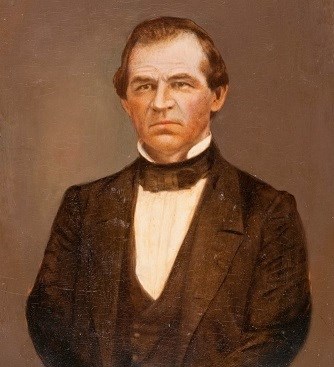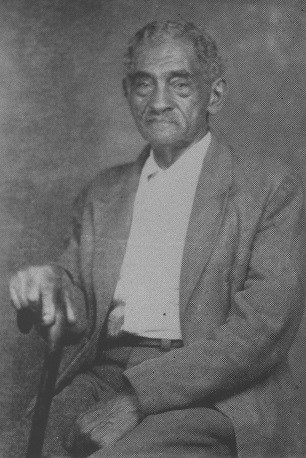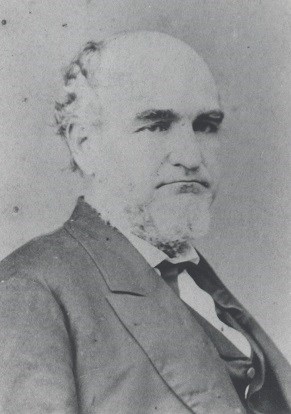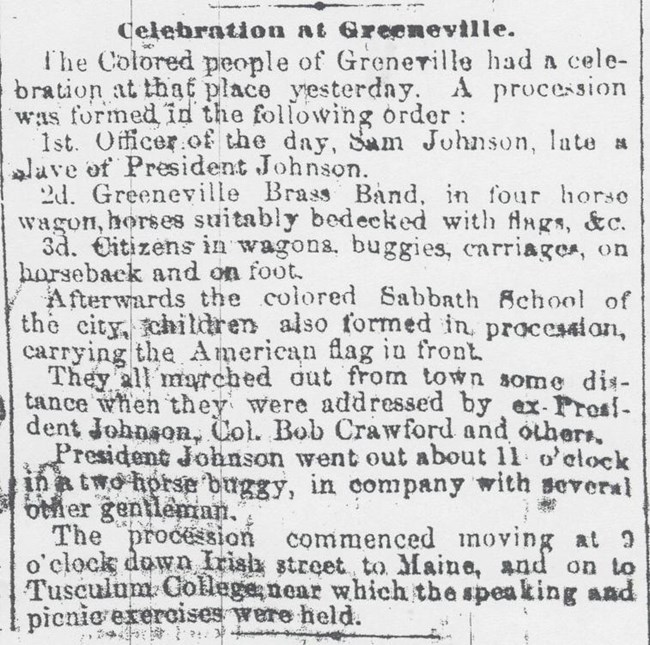
NPS Image “ I have owned slaves — They were confiscated and sold; yet two of them ran away…and came here to me. I hired them – made a bargain with them for their labor, and thus recognized their freedom. And I find they do better than when they were slaves. Now if any of you are slave owners, I advise you to go and do likewise, while you have the chance.” Andrew Johnson, January 1864 What is August 8th?

NPS Image What do we know about August 8th's beginnings?
“One day Mrs. Johnson called us all in and said we were free now. She said we were free to go, or we could stay if we wanted 
NPS Image David Patterson & Mrs. L StoryAndrew Johnson received a letter from Mrs. L Story in 18__, in which she wrote:
“In the fall of 1863, while enroute to Nashville, Judge Patterson brought seven negroes and several small children to my house to stay until he could get them transported to you at Nashville, they as he stated being your servants and going to you for that purpose. He promised upon arrival at Nashville to return pay for their keeping which he never did.” (Franklin House, Knoxville, Tennessee, Andrew Johnson, Governor of Tennessee to Mrs. L. Story) To board 4 women and 3 men with several children all negroes for 3 weeks.....DUE $139.65.”
In October 1863 - the Patterson family was “given transportation to enable them to join Military Governor Johnson and other family members in Nashville.” 
NPS Photo Sam JohnsonThe most definitive evidence comes in 1871, when Johnson's former slave, Sam Johnson, was the "Officer of the Day" at an August 8th event in Greeneville, TN. Their celebration of Emancipation included a parade, speeches, and a picnic. Andrew Johnson attended and spoke at the event. The event was recorded in the Knoxville Daily Chronicle.Sam's efforts at making this a standing regional event were recogized in the Knoxville Journal and Tribune, August 8th 1921: "In most states January 1 is observed as Emancipation Day, but in Tennessee and a few other states, August 8 has been designated as the date for emancipation day exercises. This custom originated because negroes owned by Andrew Johnson, at Greeneville, were set free on August 8, and Sam Johnson, one of the former slaves of Andrew Johnson, worked for a long time and was successful in having August 8 set aside for Emancipation Day observed in this section." Sam Johnson's LegacyAlthough originally a regional celebration, before long August 8th events were taking place in Alabama, Kentucky, Arkansas, and Mississippi. Train excursions brought people from Ohio and North & South Carolina. Steamboats carried people from Nashville to a celebration in Clarksville, TN. Knoxville became a major hub as several of the Johnson slave descendants settled in the city. National figures participated in and supported August 8th celebrations. Louis Armstrong performed at an event in Knoxville in 1937, and Tiny Bradshaw's Band played in 1939. The “International Sweethearts of Rhythm,” a racially integrated women’s band, played at the 1941 August 8th celebration in Knoxville. They were composed of Chinese, Indian, Mexican, and African-American women, and they toured both nationally and internationally. August 8th continues as a day of celebration, thanks to the work of dedicated community members and groups. 
NPS Images |
Last updated: July 24, 2020
